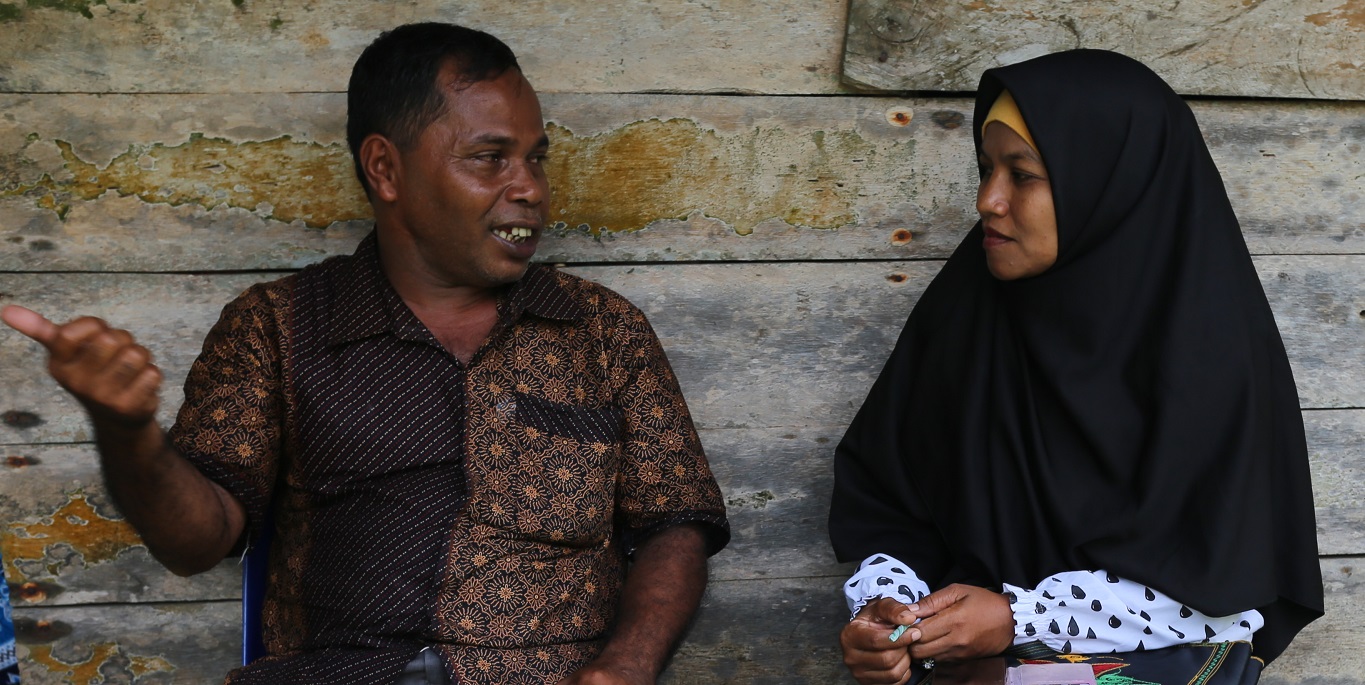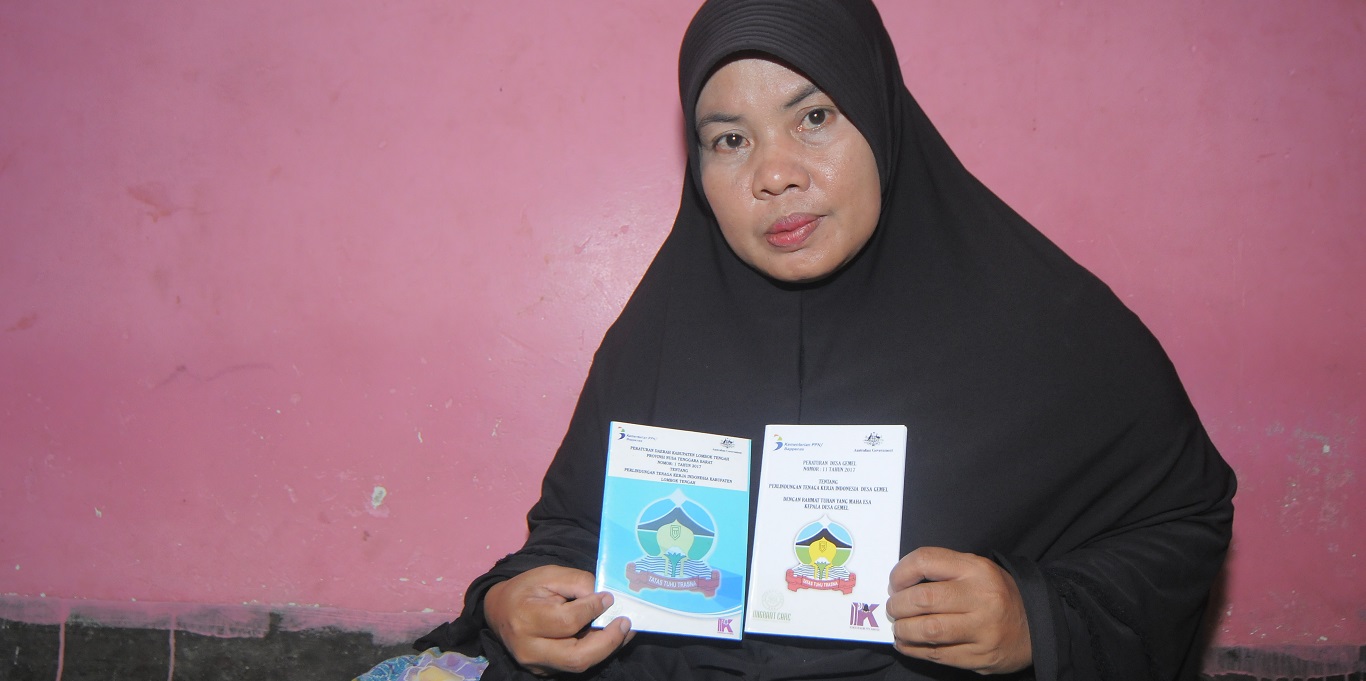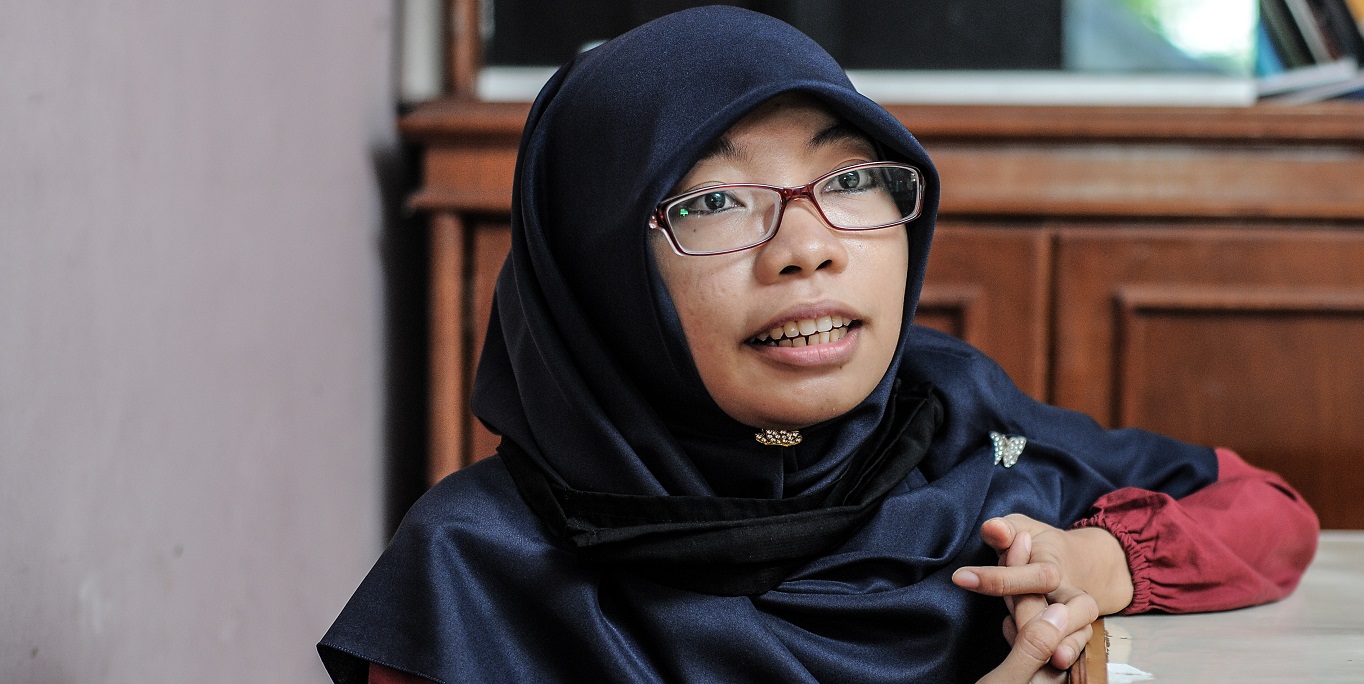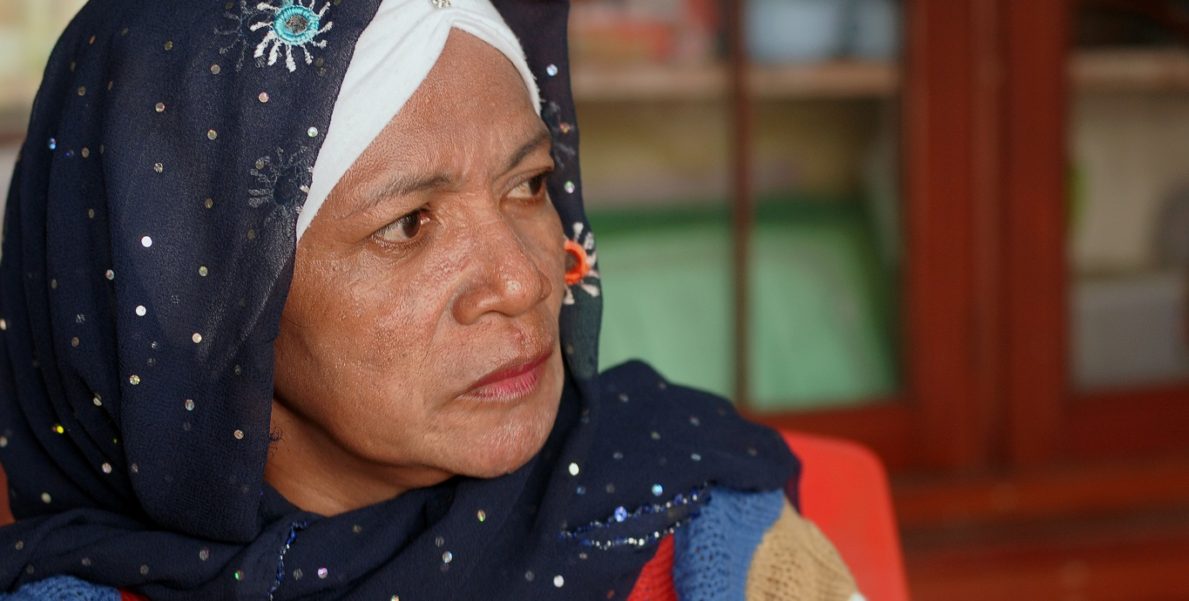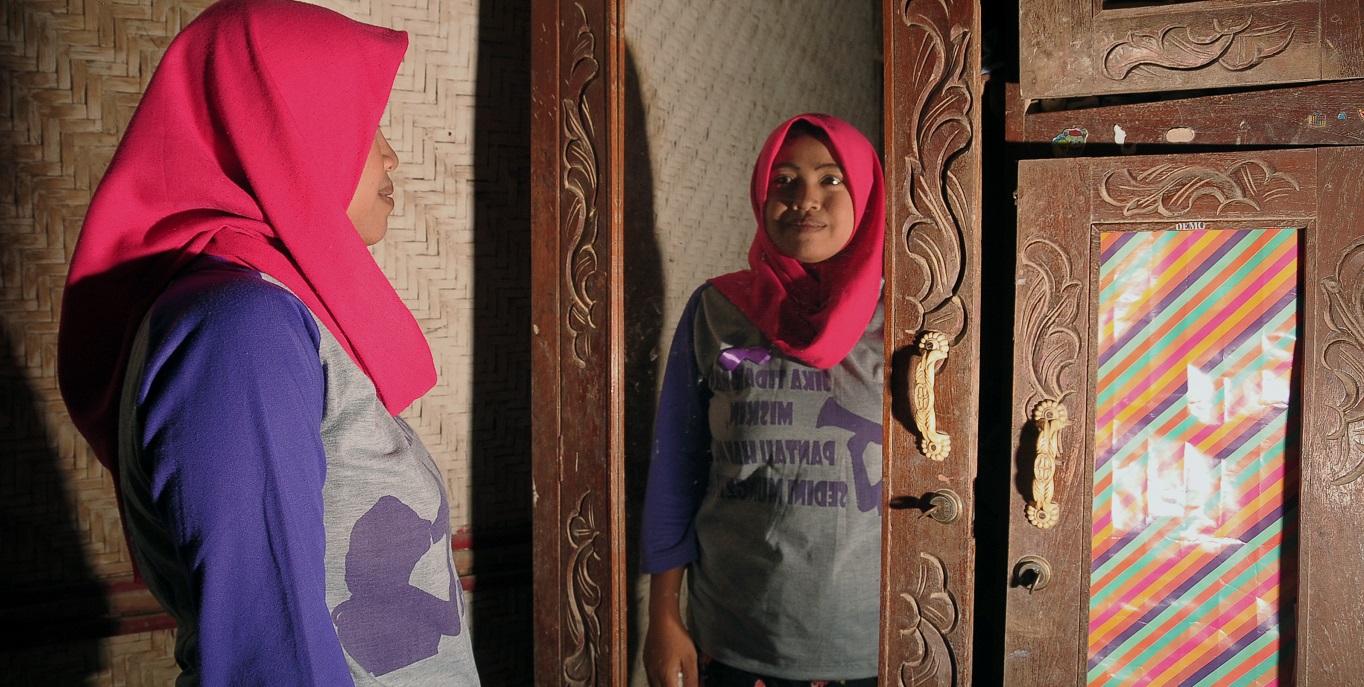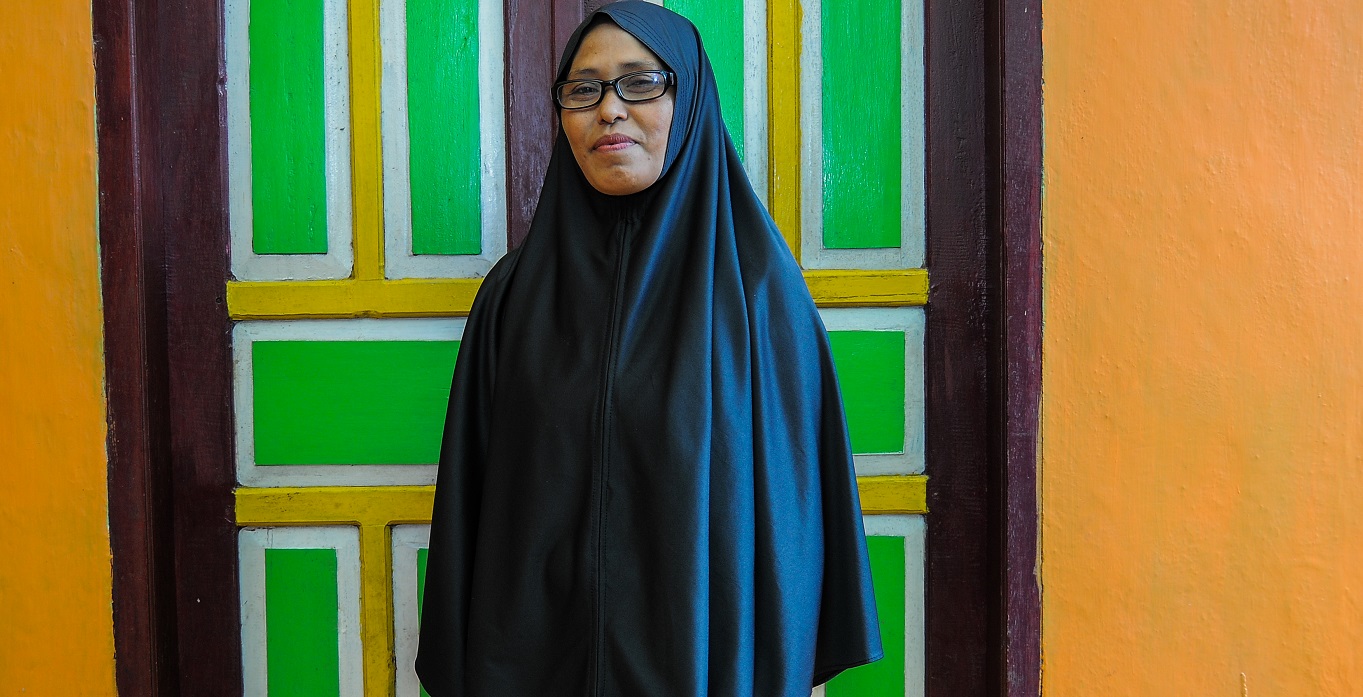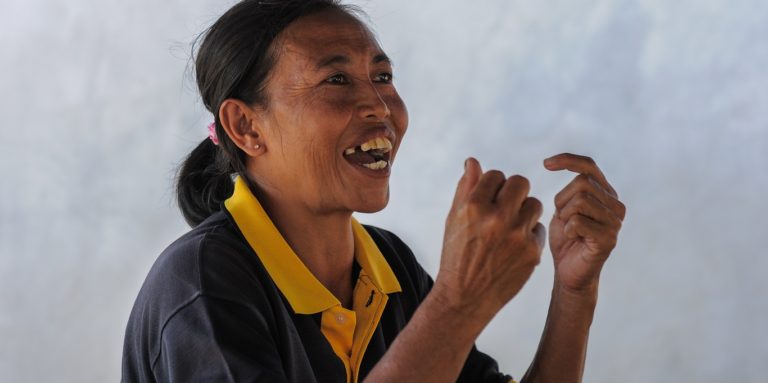Stories
Saraiyah, a Powerful Voice Now Heard
12 October 2018Penulis: admin

On the morning of Sunday 29 July 2018, Saraiyah was watering her vegetable garden at her home in Lokok Buak, a hamlet that lies in the District of Bayan, North Lombok Regency. Suddenly the ground she was standing on began to shake violently, causing the walls of her house to crack. The 6.4 Richter scale earthquake which shook Lombok forced Saraiyah to take refuge at the foot of Mount Rinjani, in the hamlet of Segenter. This camp, which became a shelter for the residents of five hamlets, was initially only equipped with one tent made out of a tarpaulin and some mats.
“I called all the members of Sekolah Perempuan who I could contact in order to coordinate about what we could do. As a contact person, my mobile number was shared around,” told the the head of Sekolah Perempuan at Sukadana Village.
At the evacuation centre in the Hamlet of Segenter, Saraiyah and a number of members of other Sekolah Perempuan created a Women’s Post (Pos Perempuan). This post was a joint initiative between Sekolah Perempuan, KAPAL Perempuan Institute and their subpartner Lembaga Pengembangan Sumber Daya Mitra (LPSDM) West Nusa Tenggara, funded by MAMPU. There, Saraiyah assisted in arranging logistics and the distribution of aid, she also initiated a public kitchen, and coordinated a roster to take sick people to the hospital and worked to collect the personal data of the citizens who had lost their identity documents in the disaster.
Understanding that women have unique vulnerabilities in post-disaster situations, Saraiyah and her colleagues from Sekolah Perempuan took a number of steps to create a sense of security and comfort for the displaced women. Besides erecting tents that featured barriers between the male and female sections to prevent sexual harassment, the women also initiated an emergency customary village regulation or awig-awig to ensure there was order in the camp.
Because it was an emergency, we could not display the rules on the tents. So we gathered the men around the tent to have a meeting, and we agreed to create an awig-awig,” said Saraiyah.
“There were a number of things that were covered in the regulation, for example, smoking was prohibited in the tent because there were pregnant women and breastfeeding women inside, it also regulated sleeping times to ensure that there were always men who would stand by on watch,” added Saraiyah, who now sleeps in a tent in the terrace of her house.
The Sekolah Perempuan at Sukadana Village was established on February 22, 2014. In its early days, the resolute Saraiyah faced many challenges. “In the beginning, we were often labelled a group who were calling on women to fight against their husbands and oppose the customs,” she recalled.
Saraiyah, who is now 46 years old, was initially confused when the KAPAL Perempuan Institute, MAMPU’s partner, invited her to establish a Women’s School. “I thought, what is that, a Women’s School? Will I have to wear smart clothes like a school student? What do they want from us old, poor women?”
Speaking out for Women
After joining in the activities of the Women’s School, Saraiyah’s doubts subsided. The school’s classes take part in a relaxed environment, and the participants take turns to host the classes at their respective houses; sometimes classes are even held in nature such as at the beach or in rice fields. The study materials are created in accordance with the needs of the participants and based on the results of their monthly discussions.

“Before the school, we didn’t have the confidence to speak in front of people. Family problems were considered a source of embarrassment that could not be talked about with other people,” told Saraiyah, who explained that she had the opportunity to learn many new things at Women’s School. “This is despite many of us not having high educations, most of us have only graduated from primary school or junior high school, some did not even graduate from primary school,” added the high school graduate.
Saraiyah’s knowledge, especially regarding women’s rights, continues to grow. Whenever injustices befall women in her community, she mobilizes to fight for their rights.
Saraiyah’s struggle to uphold justice for women pushes her to break through traditional and customary barriers. She believes that customs can be altered if these customs disadvantage women. “It is only the Koran and the hadiths that cannot be changed, we can change our customs and our habits,” she said.
Saraiyah is not concerned about other people’s religions when fighting for their rights. This was evident when Saraiyah was advocating for the road in the Hamlet of Kebon Patu to be repaired. Sariayah was concerned because the road was steep and narrow and contributing to maternal mortality rates in the area while creating economic barriers for the hamlet which is a cacao farming hub. However, despite her good intentions, the head of the hamlet questioned Saraiyah’s motivations because the majority of residents in that hamlet were of a different religion to her own.
“I told the head of the hamlet, development should not only benefit a small group of people. We must strive so that all members of the community can enjoy development, without caring about people’s religion,” Saraiyah, who is a member of Team 11 developing the Mid Term Development Plan for the Village of Sukadana, recalled.
Her advice was not only taken to the village head but also presented in Development Planning Meetings (Musrenbang) at the district and regency level. Now the construction of a new road in the Hamlet of Kebon Patu has become a priority program of the government.
Making an impact
The determination of Saraiyah and other members of the school has led to the Women’s School at Sukadana Village to be acknowledged by local residents and the government. In addition to holding women’s specific development planning meetings since 2015, known as Musrenbang Perempuan, the Regency of North Lombok also has plans to replicate the Women’s School in a number of other villages. Saraiyah has been appointed as one of the facilitators to assist with the replication process.
“Before, the voices of women were not heard, and their concerns weren’t taken seriously. Now, if we speak, the men listen to us,” she explained.

Another notable initiative that Saraiyah and other members of the Women’s School began is a program to create organic vegetable gardens in each of their houses. The produce they are able to harvest from these gardens helps to build their skills and also acts as a form of economic empowerment for the women. Last May, The Food Security and Agriculture Office of the North Lombok Regency visited Saraiyah’s house and invited the Women’s School at Sukadana Village
to become a partner of the Kawasan Rumah Pangan Lestari (KRPL), a program that promotes community-based sustainable vegetable gardens.
After the earthquake, Saraiyah has been striving to restart the KRPL program, so that women in the displaced persons camps have a productive activity to fill their time and to distract them from being worried about their present situation.
In addition to working in the kitchen to manage the vegetables that the KRPL village garden produces, Saraiyah also worked with the local Agriculture Department to hold KRPL training sessions at the Sukadana Village in August. On a Sunday in October almost 60 women joined in the training about how to manage local produces held in cooperation with the Provincial Government of West Nusa Tenggara and MAMPU subpartner LPSDM in the Tanjung district.
Witnessing all of the panic that resulted from last July’s earthquake and the aftershocks that followed, Saraiyah became aware that sadness does not need to end in a loss of hope. In a situation where countless challenges and limitations were faced, Saraiyah never ceased encouraging residents in the emergency camps to make time to talk about issues related to their mental health and wellbeing.
“We cannot just sit quietly in fear while waiting for aid,” she concluded, resolutely.



